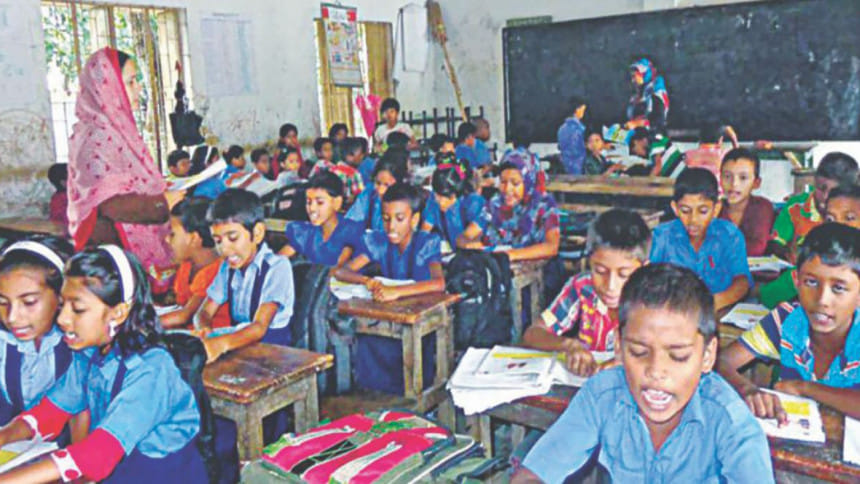Thinking School: A catalyst for transformational change in education

It's a common scene to see children in our streets in the early morning going to school, carrying heavy bags full of books on their shoulders. Schools put excessive pressure on students. Their heads remain buried in books, trying to remember their lessons and there is nothing else they can do. Students are usually expected to listen and remember. Something is clearly wrong with our education system.
Over eighty-five thousand foreigners work in different capacities in Bangladesh and remit out over USD 2 billion, as our universities have failed to produce graduates with high-level skills and innovative capacity. According to Bloom's Taxonomy (a set of three hierarchical models used to classify educational learning objectives), recalling facts is at the lower end of the spectrum of critical thinking skills. Application and synthesis of knowledge are at the top of Bloom's Taxonomy. The critical attribute of intelligent human beings is not only about having information, but also knowing how to act on it. People in the business world are repeatedly telling us that the jobs of the future have not even been created yet, thus students need to know how to think, adapt, work together, and communicate. For this reason, the education that we provide to our children needs to be revamped.
A school or a university should be a place that encourages both students and staff to think critically, creatively and reflectively, ensuring that its curriculum is meaningful and focuses on skills and techniques and not solely on content. This type of school is called "Thinking School". The transition from a primary focus on teacher's quality of instruction to student's quality of thinking is an essential discovery on the path to a Thinking School.
Pupils in a Thinking School are encouraged to develop and demonstrate independent and co-operative learning. Increasingly, educators across North America, Europe and some countries in Asia and South Africa are working to re-culture schools into Thinking Schools. The development of creative and critical thinking skills in students is crucial for increasing a country's capability and effectiveness to cope with the changes of a transient economy in light of globalisation.
Every year, about three million young people are entering the job market in Bangladesh. But industry and service sectors are not being developed adequately to provide jobs for such a large number of job-seekers. This challenge can be faced if universities produce graduates with high-level skills and innovative thinking. With such graduates Bangladesh can create a knowledge-based society, and more opportunities will be created for them to get jobs in the global marketplace. Graduates can be successful as entrepreneurs and be self-employed. Such dispositions demand changes in our existing curriculums, teaching and assessment methods.
Therefore, it is time to launch the "Thinking School" focusing on key strategies such as: (i) infusion of critical and creative thinking skills into the school as well as university curricula, (ii) reduction of subject content, and (iii) revision of assessment modes. Evidence (Ames & Archer, 1988) shows that cooperative learning and group discussion promote increased use of higher-order skills and higher reasoning capabilities. Task structures such as focused discussion, student-led seminars, problem-based learning and role play have been shown to enhance critical thinking. In almost all studies on instructional procedures focusing on secondary and higher education, discussion and dialogue played a key role in promoting student thinking (Commeyras, 1993).
Research could focus on how the curriculum could be organised to stimulate creativity. Assessment criteria must be changed from product-oriented methods to support a process-based curriculum. Unless the criteria of assessing the students' behaviours and achievements are modified to accommodate unusual ideas and unexpected behaviours, teachers and students are likely to maintain their current mindsets. To facilitate a more process-based curriculum assessment, assessment should be viewed as a form of feedback on how well teaching and learning have taken place. In schools, students should only have a couple of classes a day. They should have enough time for lunch, enjoy recreational activities and generally just relax. Spread throughout the day should be intervals of 15-to-20 minutes where the children can get up and stretch, get some fresh air and so on.
Large class size, limited physical space, lack of resources, and insufficient time to complete the syllabuses are among factors that hinder the fostering of such thinking. The constraints of insufficient time and the haste to cover the curriculum have often led to rigid and structured ways of teaching that leave little room for creativity or flexibility.
A supportive school culture is needed to cultivate dispositions related to fostering constructive creativity and critical thinking. ICT can be used as a tool for developing thinking skills and facilitating critical thinking and higher-order learning. When using electronic devices, an intellectual student-computer partnership is established where the computer amplifies the student's thinking. Cognitive tools are designed to make learners think harder about the subject matter being studied while generating thoughts that would be impossible without the tool.
Teachers are the fundamental lever for promoting students' creativity. Before implementing Thinking Schools, teachers must be properly trained by experts in this area. Otherwise, we cannot succeed. The Ministry of Education should set up a Thinking Unit for schools, and the UGC should also set up such a unit for universities. These units will develop a learning environment that includes educational institutions, teachers and university managements.
MM Shahidul Hassan is Vice Chancellor, East West University. Email: [email protected]





Comments